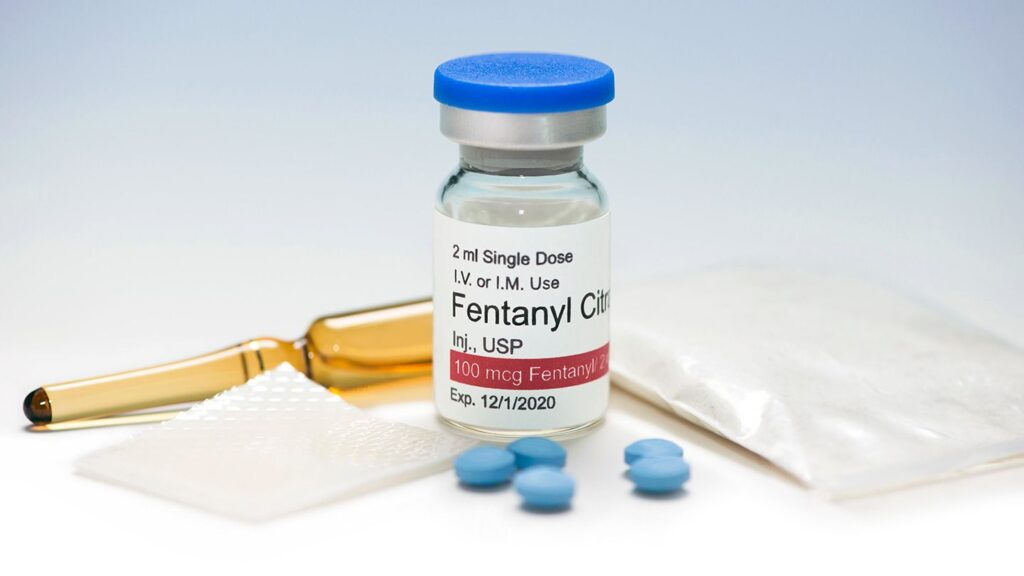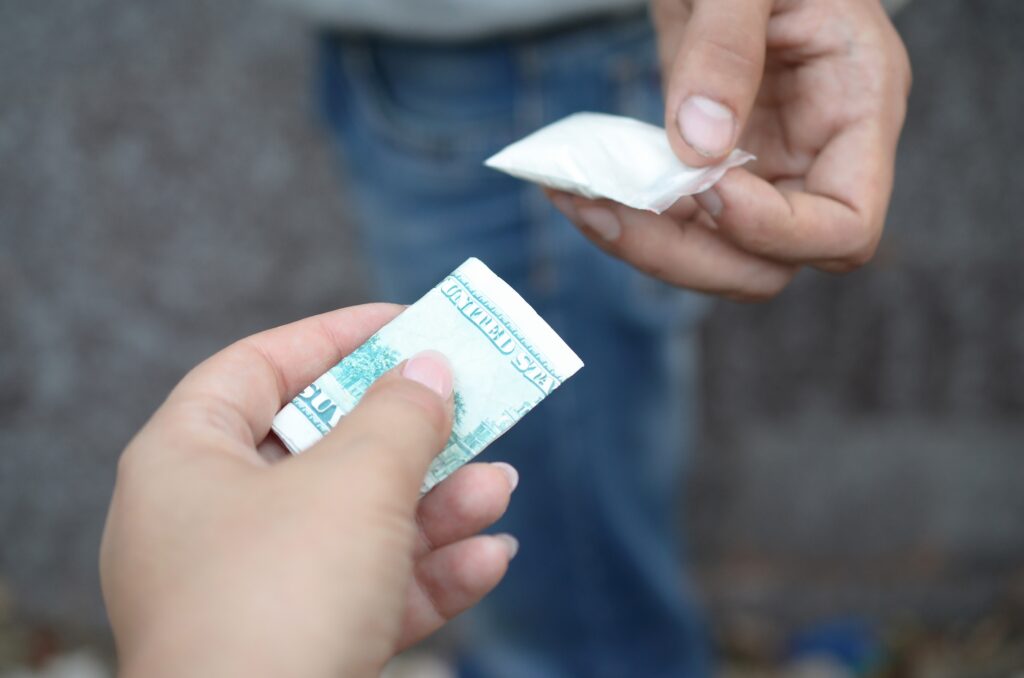Dangers of Fentanyl and Getting Help
Jun 28, 2022
By now, just about everybody has heard of fentanyl and the dangers it possesses. In 2020, deaths in the United States involving synthetic opioids other than methadone (primarily fentanyl) totaled 56,516. It is currently estimated that nearly four times as many people are dying from drug overdose than from homicide and that fentanyl is responsible for 77% of teen overdose deaths.
This article explains what fentanyl is, how fentanyl is used, how to get help with fentanyl addiction, and treatment for fentanyl addiction.

What is fentanyl and is fentanyl dangerous?
What is Fentanyl?
Fentanyl is a powerful synthetic opioid that is similar to morphine but is 50 to 100 times more potent. Fentanyl is a prescription drug that is also made and used illegally. Like morphine, it is a medicine that is typically used to treat patients with severe pain, especially after surgery. It is also sometimes used to treat patients with chronic pain who are physically tolerant to other opioids. Tolerance occurs when you need a higher and/or more frequent amount of a drug to get the desired effects.
In its prescription form, fentanyl is known by such names as Actiq, Duragesic, and Sublimaze.
Why is Fentanyl Dangerous?
Answering why fentanyl is dangerous is as simple as explaining the effects of opioids. Opioids work by attaching to opioid receptors in the brain. These neurotransmitters are responsible for feelings of pleasure and pain, so when this synthetic drug attaches to them, it can relieve pain and induce a sense of euphoria.
Even after the first dose, a person’s body will crave the drug again. This is due to the brain’s reward centers. The pleasurable chemicals released by this process in the brain are reinforcing, enough that the negative effects seem inconsequential to the user.
One of the reasons why fentanyl is so dangerous is due to the side effects of repetitive use. In addition to pain relief and pleasure, here are some of the harmful symptoms of fentanyl addiction:
- Drowsiness, insomnia
- Nausea, vomiting
- Trouble focusing or making decisions
- Slowed heart rate
- Decreased, shallow, or irregular breathing
- Sedation
- Loss of consciousness
The most dangerous side effect is fentanyl overdose death. Sadly, this is the route that any addiction will likely take if left untreated. Due to the nature of these substances, as tolerance builds so will the impact of the drug. Overdose typically is due to a depressed central nervous system.
According to Mayo Clinic, what makes opioids beneficial for some medical purposes also makes them dangerous. Because opioids are so effective at pain relief, an addiction may develop, even when someone is only using the medication that was prescribed.
While fentanyl works like other opioids, it’s also much more potent. The DEA states that fentanyl is 100 times more powerful than morphine and 50 times more powerful than heroin as an analgesic drug.
Why is fentanyl dangerous? Generally, it’s because of the large dosage that many people consume. The DEA states that about 2 milligrams of the pure substance are sufficient to be considered a lethal dose. Among confiscated pills that have been illegally distributed and tested for fentanyl, approximately 42% of them have been 2 milligrams or higher.
How is Fentanyl Used?
When prescribed by a doctor, fentanyl can be given as a shot, a patch that is put on a person’s skin, or as lozenges that are sucked like cough drops.
The illegally used fentanyl most often associated with recent overdoses is made in labs. This synthetic fentanyl is sold illegally as a powder, dropped onto blotter paper, put in eye droppers and nasal sprays, or made into pills that look like other prescription opioids.
Some drug dealers are mixing fentanyl with other drugs, such as heroin, cocaine, methamphetamine, and MDMA. This is because it takes very little to produce a high with fentanyl, making it a cheaper option. This is especially risky when people taking drugs don’t realize they might contain fentanyl as a cheap but dangerous additive. They might be taking stronger opioids than their bodies are used to and can be more likely to overdose.
To learn more about the mixture of fentanyl into other drugs, visit the Drug Enforcement Administration’s Drug Facts on fentanyl.

Fentanyl Overdose Symptoms & How To Get Help With Fentanyl Addiction
Helping Someone That Overdoses on Fentanyl
As mentioned above, many drug dealers mix the cheaper fentanyl with other drugs like heroin, cocaine, MDMA, and methamphetamine to increase their profits, making it often difficult to know which drug is causing the overdose.
Naloxone is a medicine that can treat a fentanyl overdose when given right away. It works by rapidly binding to opioid receptors and blocking the effects of opioid drugs. But fentanyl is stronger than other opioid drugs like morphine and might require multiple doses of naloxone.
Because of this, if you suspect someone has overdosed, the most important step to take is to call 911 so they can receive immediate medical attention. Once medical personnel arrives, they can administer naloxone if they suspect an opioid drug is involved.
Naloxone is available as an injectable (needle) solution and nasal sprays (NARCAN® and KLOXXADO®). These can be purchased from most pharmacies without a prescription from a doctor.
Fentanyl Overdose Symptoms
A person that is overdosing on fentanyl may exhibit the following signs and symptoms:
- Low blood pressure
- Drowsiness
- Dizziness
- Nausea and vomiting
- Limp body
- Changes in pupillary size
- Cold and clammy skin
- Blue-colored lips and fingernails (cyanosis)
- Slowed or stopped breathing
- Decreased heart rate
- Reduced or loss of consciousness
- Coma
Getting Treatment for Fentanyl Addiction
Like other opioid addictions, medication with behavioral therapies has been shown to be effective in treating people with fentanyl addiction.
Medicated Assisted Treatment
Medication-assisted treatment (MAT) is the use of medications, in combination with counseling and behavioral therapies, to provide a “whole-patient” approach to the treatment of substance use disorders. Medications used in MAT are approved by the Food and Drug Administration (FDA) and MAT programs are clinically driven and tailored to meet each patient’s needs.
Research shows that a combination of medication and therapy can successfully treat these disorders, and for some people struggling with addiction, MAT can help sustain recovery. MAT is also used to prevent or reduce opioid overdose.
MAT is primarily used for the treatment of addiction to opioids such as heroin and prescription pain relievers that contain opiates. The prescribed medication operates to normalize brain chemistry, block the euphoric effects of alcohol and opioids, relieve physiological cravings, and normalize body functions without the negative and euphoric effects of the substance used.
Medications used in MAT treatment such as buprenorphine and methadone work by binding to the same opioid receptors in the brain as fentanyl, reducing cravings and withdrawal symptoms. Another medicine, naltrexone, blocks opioid receptors and prevents fentanyl from having an effect. People can discuss treatment options with their health provider.
HealthCore Clinic offers MAT treatment and substance abuse treatment through our comprehensive behavioral health department in Wichita, Kansas.
To get help with fentanyl addiction, speak with a member of our team today.
Counseling & Behavioral Health Therapy
Counseling and behavioral therapies for addiction to opioids like fentanyl can help people modify their attitudes and behaviors related to drug use, increase healthy life skills, and help them stick with their medication. Some examples include:
- Cognitive Behavioral Therapy helps modify the patient’s drug use expectations and behaviors, and effectively manage triggers and stress.
- Contingency Management uses a voucher-based system giving patients “points” based on negative drug tests. They can use the points to earn items that encourage healthy living.
- Motivational Interviewing is a patient-centered counseling style that addresses a patient’s mixed feelings to change.

Treatment For Fentanyl Addiction & Overcoming Substance Abuse
Get Help With Fentanyl Addiction
Wondering how to get someone help for fentanyl addiction?
HealthCore Clinic offers substance abuse & dependency treatment as well as Medication Assisted Treatment to help with overcoming substance abuse. Our culturally appropriate mental health and substance abuse services are designed to reduce stigma and provide a comfortable and safe environment for the management of anxiety, depression, trauma, and behavioral support for other mental health and medical diagnoses.
Our substance abuse & dependency treatment includes:
- Drug & Alcohol Consultations
- After Treatment Care
- Open AA Group
- Drug & Alcohol Evaluations
- Outpatient Group & Individual Sessions
- Free After-Treatment Care
- Alcohol & Drug Education Program (ADEP)
Get help with fentanyl addiction at HealthCore Clinic with substance abuse treatment.